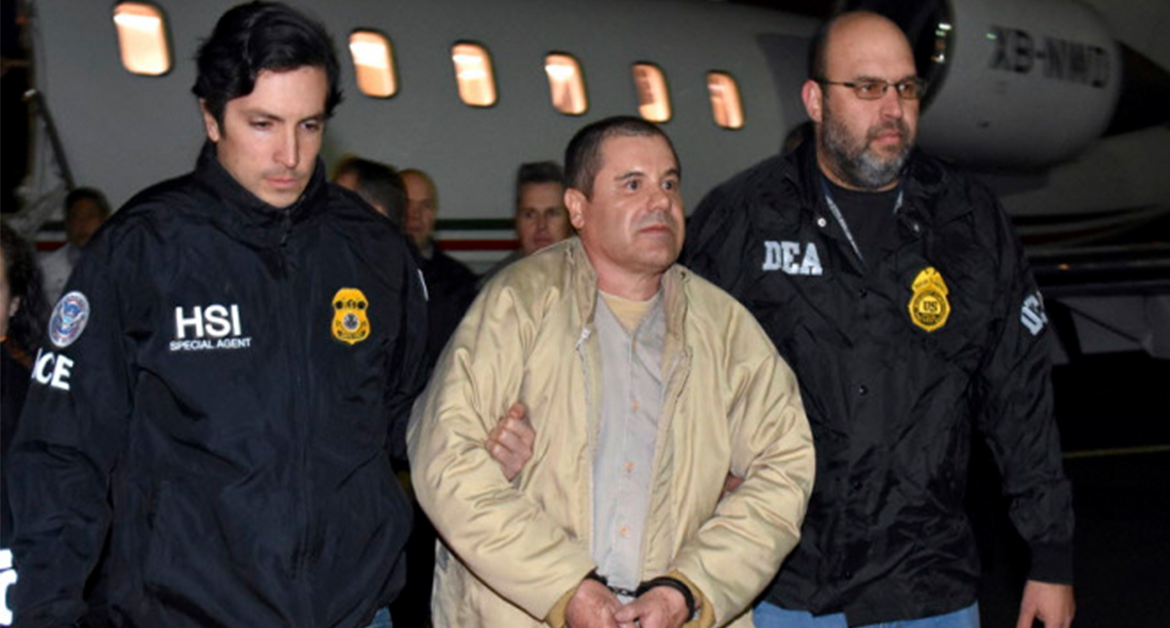Federal judge hands El Chapo life sentence
Before verdict, Mexican drug kingpin claims he did not receive fair trial

For Mexican drug kingpin Joaquin “El Chapo” Guzman, the journey through the American justice system that started with his extradition to New York in 2017 and his conviction in February came to a close Wednesday when a judge sentenced him to life in prison for running a multibillion-dollar drug smuggling ring.
In federal court in Brooklyn, U.S. District Judge Brian Cogan announced the life sentence, noting that while the law gave him no option to impose a lighter penalty, Guzman did not deserve one anyway considering the “overwhelming evil” of his crimes.
The sentence was based on the jury’s guilty verdicts on 10 felony counts, including engaging in a continuing criminal enterprise, conspiracy to commit murder, weapons possession, money laundering and international distribution of illegal drugs.
In court, Guzman, speaking through an interpreter, denounced the American justice system.
“When extradited, I expected to have a fair trial where justice was blind and my fame would not be a factor, but what happened was actually the opposite,” he said. “The government of the United States will send me to prison where my name will never be heard again. I will take this opportunity to say there was no justice here.”
Guzman also complained, as he has done many times before, about how he is being treated during his incarceration, claiming the conditions show a “lack of respect for human dignity.” “The U.S. is not better than any other corrupt country,” he said.
After the sentencing, one of Guzman’s lawyers, Jeffrey Lichtman, echoed his client’s claim that he did not receive fair treatment in the U.S. system.
“All he wanted, and he said from day one, ‘I just want a fair trial. You tell me that I can get justice here. I just want a fair trial,’” Lichtman said. “And at the end of the day we like to pretend that it was justice – it was not justice.”
Lichtman, focusing on alleged misconduct of jurors during the trial, said, “You’re never going to remove the stink from this verdict.”
But Richard P. Donaghue, U.S. attorney for the Eastern District of New York, said justice had been served.
“This sentence is significant and it is well deserved,” Donaghue said. “It means that never again will Guzman pour poison over our borders, making billions, while innocent lives are lost to drug violence and drug addiction.”
The sentencing followed a series of other setbacks for Guzman, whose appeal of the February 12 jury verdict, based on alleged misconduct by several jurors, failed to pass muster with Cogan. The judge also denied Guzman pleas for more privileges in the Metropolitan Correctional Center in Manhattan, where’s he’s served in isolation for more than two years.
Further, the U.S. Attorney’s Office for the Eastern District in Brooklyn on July 5 asked Cogan to order El Chapo to forfeit more than $12.6 billion, which prosecutors claim represents a “conservative” estimate of the fortune the drug lord amassed from trafficking hundreds of tons of cocaine, heroin and marijuana via Colombia, Mexico and Ecuador to the United States, specifically Los Angeles, Chicago, New York, between 1987 and 2010.
There was no immediate word on the federal penitentiary U.S. authorities will recommend for Guzman to serve his sentence. But it surely will be a maximum-security facility, given Guzman’s two successful escapes from Mexican federal prisons while serving time in that country. One likely option is the United States Penitentiary Administrative Maximum Facility, or ADX, in Florence, Colorado, south of Colorado Springs. Known as a highly punitive and escape-proof facility, ADX is sometimes referred to as the “supermax” or the “Alcatraz of the Rockies.”
During Guzman’s 11-week trial, the government arranged for unusual security precautions to protect jurors and alternates from potential harm or intimidation. The federal grand jury that had indicted Guzman reported that he “employed ‘sicarios’ or hitmen, who carried out hundreds of acts of violence, including murders, assaults, kidnappings, assassinations and acts of torture at the direction of the defendant.”
Federal officials ordered mandatory “active shooter” training for courtroom staff and deployed police snipers and bomb-sniffing dogs. Cogan ordered that the jury remain anonymous and under sequestration for the full extent of the trial. Security concerns during the trial prompted. But no serious security issues occurred.
Fifty-six witnesses testified against Guzman, 14 of whom were once his devoted associates in drug trafficking and murders. El Chapo’s defense team called only one witness.
Government witnesses testified that Guzman, while running the Sinaloa drug cartel in northwestern Mexico, smuggled cocaine to the United States using airplanes, fishing boats, submersible ships, oil tankers, cans of jalapenos and an underground tunnel stretching from Mexico to Arizona.
Feedback or questions? Email blog@themobmuseum.org





